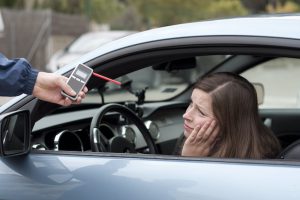“DUI” stands for “Driving Under the Influence,” while DWI stands for “Driving While Intoxicated” of “Driving While Impaired.” So, what’s the difference? The short answer to this question is that it depends on the state. Most states have a DUI charge but not a DWI charge; some states have a DWI charge but not a DUI charge, and some states use other designations such as OUI.
Typically, either offense refers to operating a motor vehicle with a Blood Alcohol Concentration (BAC) of 0.08 percent or higher, or driving under the influence of drugs. In many states, however, it is illegal for a minor to drive with any alcohol at all in his system. In almost every state it is possible to convict someone of DUI or DWI without administering a blood test, particularly if the driver refuses to be tested.
The DWI States
Most states charge intoxicated drivers with DUI. In Arkansas, Louisiana, Minnesota, Missouri, New Hampshire, New Jersey, New York, North Carolina, Rhode Island, Texas, and Virginia the police can charge you with a DWI. In most cases, DUI and DWI can be used virtually interchangeably, because they are essentially the same offense.
In some states, however, DUI is used to describe the offense of driving under the influence of alcohol, while DWI is used to describe the offense of driving under the influence of recreational or prescription drugs. Many people do not realize that they can be arrested for driving under the influence of a drug such as Valium that has been legally prescribed to them by a doctor.
Other Terms for Intoxicated Driving Used by Various States
Different states use different terms to describe intoxicated driving. The following list includes DUI/DWI-related offenses that are named differently in different states:
- OUI (Operating Under the Influence): Alaska, Connecticut, Maine, Massachusetts, and Mississippi.
- OWI: D.C., Indiana, Iowa, Louisiana, Michigan, and Wisconsin
- OVUII (Operating a Vehicle Under the Influence of an Intoxicant): Hawaii
- OVI (Operating a Vehicle under the Influence): Ohio
- DUII (Driving Under the Influence of Intoxicants): Oregon
It gets complicated in some jurisdictions. In Washington D.C., for example, you can be arrested for:
- DUI, for driving or being in physical control of a vehicle (parked with the engine running, for example) while “under the influence”;
- DWI, for driving with a blood alcohol concentration (BAC) of .08% or more; or
- OWI (Operating While Impaired) for driving while noticeably impaired by drugs or alcohol, even if a chemical test reveals a BAC below the legal limit.
Typical Penalties
DUI/DWI penalties vary significantly from state to state. One constant, however, is that the legal maximum BAC is not higher than 0.08 percent in any state, due to federal law. Some states, however, will arrest drivers for driving with a lower BAC.
Drugged Driving
The term “DWI” is sometimes reserved for drivers under the influence of a substance other than alcohol. BAC levels apply only to alcohol intoxication, not to intoxication with recreational or prescription drugs. This presents law enforcement with a difficulty – how do you establish exact intoxication standards for every drug that a person might be under the influence of while driving? After all, with modern chemistry techniques, new drugs are being invented constantly.
“Zero Tolerance” States
Many states have responded to the complexity of attempting to establish intoxication standards for hundreds of intoxicating substances by simply prohibiting all driving under even the slightest influence of any of these drugs. As of 2015, these “zero tolerance” states included:
- Arizona
- Delaware
- Georgia
- Illinois
- Indiana
- Iowa
- Kentucky
- Michigan
- Minnesota
- Nevada
- North Carolina
- Ohio
- Pennsylvania
- Rhode Island
- South Dakota
- Utah
- Virginia
- Washington
- Wisconsin
Even many of the states not listed above have established standards for some commonly used substances, such as marijuana, but apply zero tolerance for less commonly used substances such as ketamine or scopolamine.
Frequently Asked Questions (FAQs)
The differing names that states use to refer to intoxicated driving cannot be used as a loophole to avoid punishment. Although Texas does not have the authority to suspend a driver’s license that was issued by Oklahoma, it can ban you from driving on Texas roads for as long as it sees fit. It can also arrest and jail you in Texas before allowing you to return to Oklahoma.
Yes. Both Texas and Oklahoma are members of the Driver License Compact, which allows member states to communicate with each other concerning the driving records of the citizens of any other member state. The only states that are not members of the Driver License Compact are Georgia, Massachusetts, Michigan, Tennessee and Wisconsin.
Texas will notify Oklahoma of your DWI arrest in Texas, and Oklahoma will rely on the facts of your case to suspend your Oklahoma driver’s license according to Oklahoma law, not Texas law. In Texas, for example, a first-offense DWI can result in a driver’s license suspension of 90 days to one year, while in Oklahoma the suspension period for a first-offense DUI is 180 days.
If the facts that supported your conviction in Texas would amount to DUI in Oklahoma, you will be treated as if you had committed DUI in Oklahoma, at least with respect to the suspension of your driver’s license.
There is always a time lapse between drinking alcohol and the resulting intoxication. If you drank heavily in a short time immediately before being pulled over (in a “beer chugging contest” at a college fraternity party, for example), you might not have been legally intoxicated yet by the time you were pulled over.
You could then argue that the reason your BAC was over the legal limit was because by the time you were tested, which could have been several minutes or even an hour after you were pulled over, your blood alcohol content had risen above the legal limit. You could then proceed to argue that if you had not been pulled over by the police, you would have been back home by that time and you would not have been driving at all.


